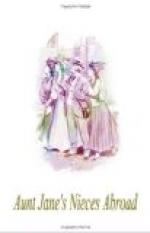“He thinks you want to go to the volcano, Uncle. The hotel is the Vesuve, not the Vesuvius.”
“What’s the difference?”
“I don’t know.”
“All right; you girls just hop in, and leave the rest to me.”
He tumbled them all into the vehicle, bag and baggage, and then said sternly to the driver:
“Ho-tel Ve-suve—Ve-suve—ho-tel Ve-suve! Drive there darned quick, or I’ll break your confounded neck.”
The carriage started. It plowed its way jerkily through the dust-laden streets and finally stopped at an imposing looking structure. The day was growing darker, and an electric lamp burned before the entrance. But no one came out to receive them.
Uncle John climbed out and read the sign. “Hotel du Vesuve.” It was the establishment he had been advised to stop at while in Naples. He compared the sign with a card which he drew from his pocket, and knew that he had made no mistake.
Entering the spacious lobby, he found it deserted. In the office a man was hastily making a package of some books and papers and did not respond or even look up when spoken to. At the concierge’s desk a big, whiskered man sat staring straight ahead of him with a look of abject terror in his eyes.
“Good morning,” said Uncle John. “Fine day, isn’t it?”
“Did you hear it?” whispered the concierge, as a dull boom, like that of a distant cannon, made the windows rattle in their casements.
“Of course,” replied Mr. Merrick, carelessly. “Old Vesuve seems on a rampage. But never mind that now. We’ve just come from America, where the mountains are more polite, and we’re going to stop at your hotel.”
The concierge’s eyes wandered from the man to the three girls who had entered and grouped themselves behind him. Then they fell upon the driver of the carriage, who burst into a torrent of vociferous but wholly unintelligible exclamations which Uncle John declared “must be an excuse—and a mighty poor one—for talking.”
The whiskered man, whose cap was elaborately embroidered in gold with the words “Hotel du Vesuve,” seemed to understand the driver. He sighed drearily and said to Mr. Merrick:
“You must pay him thirty lira.”
“How much is that?”
“Six dollars.”
“Not by a jugfull!”
“You made no bargain.”
“I couldn’t. He can’t talk.”
“He claims it is you who cannot talk.”
“What!”
“And prices are advanced during these awful days. What does it matter? Your money will do you no good when we are all buried deep in ash and scoria.”
The big man shuddered at this gloomy picture, and
added, listlessly:
“You’ll have to pay.”
Uncle John paid, but the driver wouldn’t accept American money. The disconsolate concierge would, though. He unlocked a drawer, put the six dollars into one section and drew from another two ten-lira notes. The driver took them, bowed respectfully to the whiskered man, shot a broadside of invective Italian at the unconscious Americans, and left the hotel.




